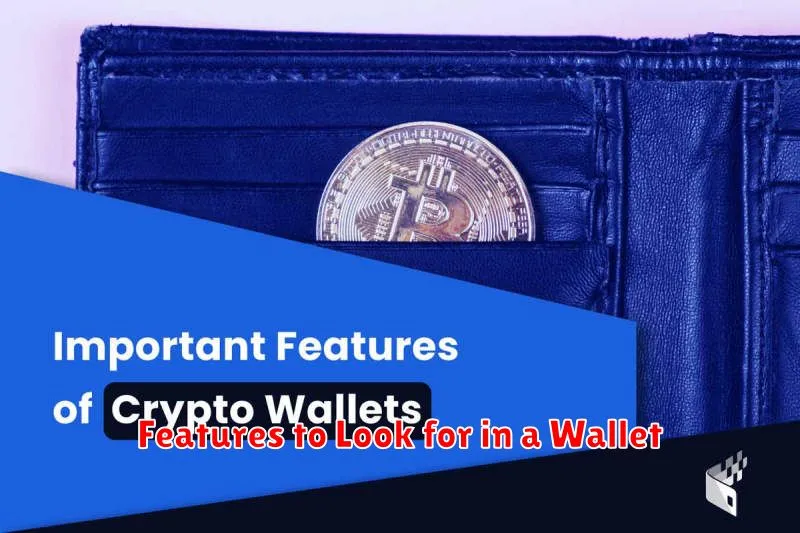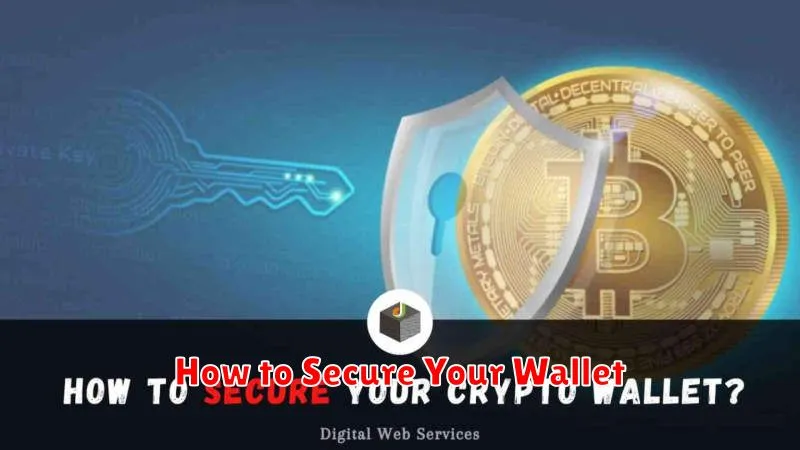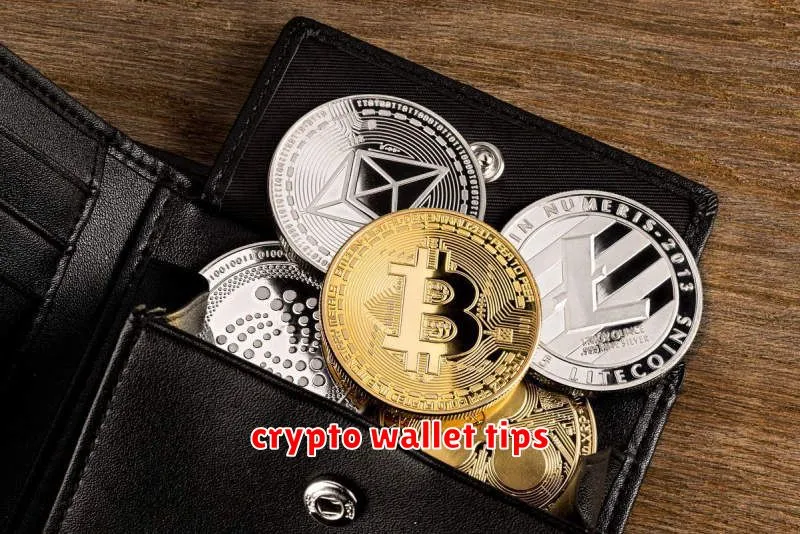Choosing the right crypto wallet can feel overwhelming, especially for beginners. With so many options available, from hardware wallets to software wallets and mobile wallets, knowing where to start can be tricky. This guide will walk you through the essential factors to consider when selecting a crypto wallet, helping you confidently store and manage your digital assets. We’ll cover everything from security and user-friendliness to compatibility and fees, ensuring you find the perfect cryptocurrency wallet for your needs. Let’s dive in and make your crypto journey a secure one!
What is a Crypto Wallet?
A crypto wallet isn’t a physical wallet like the one you carry your cash in. Instead, it’s a software program or a hardware device that allows you to store, send, and receive cryptocurrencies like Bitcoin or Ethereum.
Think of it as a digital bank account, but instead of holding traditional fiat currency, it holds your private keys. These private keys are crucial; they are essentially the passwords that prove your ownership of your crypto assets. Without them, you cannot access your funds.
There are different types of crypto wallets, each with its own advantages and disadvantages. We’ll explore these further in the following sections, but the core function remains the same: securely storing your cryptocurrency.
Importantly, your wallet doesn’t actually *store* your cryptocurrencies on the device itself. Cryptocurrencies exist on the blockchain, a public, decentralized ledger. Your wallet simply stores the private keys needed to access and manage your coins or tokens on that blockchain.
The Difference Between Hot and Cold Wallets

Choosing the right crypto wallet is crucial for securing your digital assets. A key decision you’ll face is selecting between a hot wallet and a cold wallet. These terms refer to how the wallet connects to the internet.
A hot wallet, like a mobile app or web wallet, is constantly connected to the internet. This offers convenience for frequent transactions. However, this constant connectivity makes it more vulnerable to hacking and malware. Think of it like keeping your cash in your pocket – readily accessible, but at higher risk of theft.
In contrast, a cold wallet, such as a hardware wallet, is not connected to the internet. This significantly reduces the risk of hacking. Your cryptocurrency is stored offline, making it much safer. It’s like keeping your cash in a safe – secure, but requiring more effort to access.
The best choice depends on your needs and risk tolerance. If you frequently trade cryptocurrency, a hot wallet might be more convenient. However, if security is your top priority, a cold wallet is the recommended option, especially for storing significant amounts of cryptocurrency.
Consider the following factors: Security (how important is protecting your funds from theft?), Convenience (how often do you need to access your crypto?), and the amount of cryptocurrency you plan to store. Weighing these factors will help you make an informed decision about the type of wallet that best suits your situation.
Features to Look for in a Wallet

Choosing the right crypto wallet is crucial for securing your digital assets. Before diving in, consider these key features:
Security: This is paramount. Look for wallets with strong security protocols like multi-factor authentication (MFA), hardware security modules (HSMs) for cold storage wallets, and a proven track record of security. Read reviews and research the wallet’s history to assess its security measures.
User-Friendliness: A wallet should be easy to navigate, regardless of your technical expertise. Consider the interface’s intuitiveness and the availability of helpful resources like tutorials or FAQs.
Supported Cryptocurrencies: Ensure the wallet supports the specific cryptocurrencies you plan to hold. Some wallets specialize in certain cryptocurrencies, while others offer broader support.
Transaction Fees: Compare transaction fees across different wallets. Fees can vary significantly, impacting your overall cost.
Customer Support: Access to reliable customer support is vital in case you encounter issues. Check if the wallet provider offers various support channels like email, phone, or live chat.
Backup and Recovery Options: A robust backup and recovery system is essential in case you lose access to your wallet. Understand how to safely back up your seed phrase or private keys and the process for recovering your wallet.
Type of Wallet: Decide between a hot wallet (connected to the internet) or a cold wallet (offline storage). Hot wallets offer convenience, while cold wallets provide superior security. The best choice depends on your needs and risk tolerance.
Top Wallet Options for Beginners
Choosing your first crypto wallet can feel overwhelming, but several excellent options cater to beginners. The best choice depends on your needs and comfort level with technology. Here are a few top contenders:
Exodus is a user-friendly desktop and mobile wallet known for its intuitive interface. It supports a wide range of cryptocurrencies and offers a built-in exchange for easy trading.
Trust Wallet, a mobile-only option, is another popular choice. It boasts a simple design and integrates seamlessly with the Binance exchange, providing access to a broad array of crypto assets and decentralized applications (dApps).
Coinbase Wallet is a strong option for those already using the Coinbase exchange. It offers a user-friendly experience and secure storage for your digital assets. It’s available on both desktop and mobile.
MetaMask is a browser extension and mobile app primarily used for interacting with decentralized finance (DeFi) applications and non-fungible tokens (NFTs). While slightly more technical than others on this list, it’s highly regarded for its security and versatility.
Remember to thoroughly research each wallet before making a decision. Consider factors like supported cryptocurrencies, security features (like multi-signature support and seed phrase backups), user interface, and fees. Prioritize reputable wallets with strong security track records.
How to Secure Your Wallet

Securing your crypto wallet is paramount to protecting your digital assets. Here’s how to bolster your wallet’s security:
Choose a reputable wallet provider: Research and select a wallet with a strong track record of security and positive user reviews. Look for wallets that have undergone security audits.
Enable two-factor authentication (2FA): This adds an extra layer of security by requiring a second verification method, such as a code from your phone, in addition to your password.
Use a strong, unique password: Avoid using easily guessable passwords. A password manager can help generate and store complex, unique passwords for each of your accounts.
Keep your software updated: Regularly update your wallet software to benefit from the latest security patches and bug fixes.
Beware of phishing scams: Be cautious of suspicious emails, links, or messages that ask for your wallet information. Legitimate wallet providers will never request your seed phrase or private keys.
Store your seed phrase securely: Your seed phrase is the key to accessing your funds. Never share it with anyone, and store it offline in a safe and secure location. Consider using a hardware wallet for enhanced security.
Regularly back up your wallet: Create regular backups of your wallet data, but store them securely and separately from your primary wallet.
Be mindful of your device security: Keep your computer and mobile devices updated with the latest security software and patches. Avoid using public Wi-Fi to access your wallet.
By following these steps, you can significantly reduce the risk of losing your cryptocurrency to theft or hacking. Remember, your vigilance is your best defense.
Backup and Recovery Tips
Losing access to your crypto wallet can mean losing your cryptocurrency. Therefore, backing up your wallet and understanding recovery procedures is crucial. This is non-negotiable for secure cryptocurrency ownership.
Seed phrases (also known as recovery phrases or mnemonic phrases) are the most important element of your wallet’s security. This is a list of 12-24 random words that act as a key to access your funds. Write down your seed phrase on paper, store it in a safe place, and never store it digitally. Consider using a metal plate or a safety deposit box. Never share your seed phrase with anyone.
Regular backups are also important. If your device malfunctions or is lost/stolen, a recent backup will help you recover your wallet. Many wallets offer options to export a private key. While this is an alternative to a seed phrase, it is generally less secure and easier to lose. Always follow the specific backup instructions for your chosen wallet.
Understanding your wallet’s recovery process is vital. Before you need it, familiarize yourself with the steps involved in recovering your wallet from your seed phrase or backup. This will save you valuable time and reduce stress in a critical situation. Remember, once your seed phrase is lost, your cryptocurrency is likely gone for good.
Finally, consider using a hardware wallet. These offer an extra layer of security by storing your private keys offline, making them significantly more resistant to hacking and theft.
Avoiding Common Wallet Scams
Choosing a crypto wallet is crucial, but equally important is understanding how to avoid scams. Phishing is a major threat. Be wary of emails, text messages, or websites claiming to be from legitimate cryptocurrency exchanges or wallet providers, asking for your seed phrase or private keys. Never share this information with anyone.
Another common scam involves fake wallets or apps. Download only from official app stores or the wallet provider’s website. Verify the website’s authenticity using SSL certificates (the padlock icon in your browser’s address bar). Beware of apps promising unrealistically high returns or those with poor reviews.
Social engineering scams prey on your trust. Be cautious of unsolicited messages from strangers promising assistance or offering “help” with your wallet. Legitimate support channels will never ask for your private information. Always independently verify any information you receive.
Finally, be mindful of your online security practices. Use strong, unique passwords, and enable two-factor authentication (2FA) whenever possible. This adds an extra layer of security, making it harder for scammers to access your wallet even if they obtain your password.
Using Wallets for Different Crypto Assets
Choosing the right crypto wallet depends heavily on the types of crypto assets you plan to hold. Not all wallets support every cryptocurrency. Some wallets specialize in specific blockchains or types of cryptocurrencies.
Bitcoin wallets, for example, will only store Bitcoin. Similarly, Ethereum wallets are designed specifically for Ether and ERC-20 tokens built on the Ethereum blockchain. However, some wallets offer support for multiple cryptocurrencies, often referred to as multi-currency wallets. These are convenient if you plan to diversify your portfolio.
Hardware wallets are generally considered the most secure option and often support a wide range of cryptocurrencies. However, they may have a higher initial cost. Software wallets (desktop, mobile, and web) often support a variety of cryptos, but their security relies on the strength of your device and password. Consider the security features and the specific cryptocurrencies you own when deciding on a wallet.
Before choosing a wallet, always verify the supported cryptocurrencies on the wallet provider’s website. This will ensure compatibility and avoid potential issues when adding or managing your assets.

